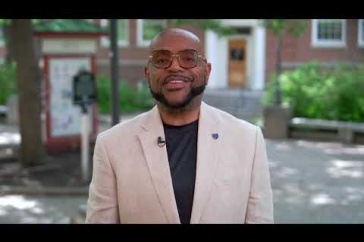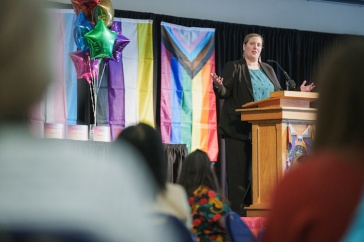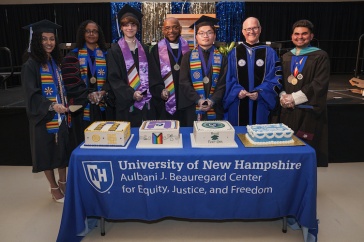
When I began visiting high schools across New Hampshire this spring to talk with students about the importance of higher education, one of my first stops was Manchester West, in a school district where many families struggle financially. Nearly 50 percent of its students qualify for free- or reduced-price lunch and just 28 percent of its graduates go on to a four-year college or university—well below the statewide average of 48 percent.
So, as you might imagine, there were a few skeptical young faces when I met with more than 100 sophomores and juniors at Manchester West in April.
At the outset, I explained that my goal in these visits is not to promote UNH exclusively. Instead, I want to get students to think about pursing education beyond high school—and to know that New Hampshire offers great options, including two-year community colleges and technical schools and four-year institutions, ranging from small liberal arts colleges to UNH and Dartmouth.
I love talking with high school students, partly because they ask great, pointed questions. In Manchester, the most common was, "How can I afford college?"
I understand why finances define these students' view of college. Higher education is expensive. At UNH, the four-year cost of attendance for in-state students is now about $110,000 and $160,000 for out-of state students. If a family sends two children to college, that's the equivalent of buying a single-family house in many New Hampshire communities—a debt few families can absorb. As a result, the students who do attend often pay by taking out astronomically large student loans.
As president of UNH, I see how well students from all walks of life perform here once they enroll. Thanks in large part to alumni donors, we can help many of them with scholarships. We also have increased financial aid in recent years. And I am proud that we have been able to freeze in-state tuition for this past academic year and next. All of these efforts reflect our deep commitment to keeping UNH affordable and accessible.
Yet, I know it is not enough. And too often, high school students from financially challenged families assume that college is simply out of reach.
Fortunately, at Manchester West, I was able to offer great examples of UNH students like them in the Class of 2014. In fact, nearly one-third of our graduates are first-generation college students, and some 80 percent receive financial aid. Among our graduates are students who, just five years ago, may have also wondered if college was a worthwhile investment.
I was also able to share examples of our successful alumni, such Academy Award winner Jennifer Lee '92, writer/director of the animated Disney movie, "Frozen." (Maybe you've heard of it.) Our keynote speaker at Commencement in Durham, Lee talked about her family's financial challenges when she was growing up. And she spoke about the incredible education she received at UNH and how the lifetime friendships she developed here helped erase her crushing self-doubts.
"When you are free from self-doubt, you fail better," Lee told our graduates. "Because you don't have your defenses up, and you can accept criticism and listen. You don't become so preoccupied with that failure, either, that you forget how to learn and how to grow. When you believe in yourself, you succeed better."
Commencement is a wonderful celebration of academic success. And in honoring the Class of 2014, we also recognize the hard work and support of the families, friends, mentors and educators who have helped our graduates realize their full potential from day one. In this way, Commencement reminds us of how important it is to reach out to the next generation. When I visit with students at high schools such as Manchester West, I see so much hope and potential—and so many future college graduates. I know how much we all want them to succeed, and I thank you for helping us to ensure that affordability is not a barrier to the many opportunities that UNH provides.
Originally published by:
UNH Magazine, Spring 2014 Issue
-
Written By:
President Mark W. Huddleston | University of New Hampshire


















































